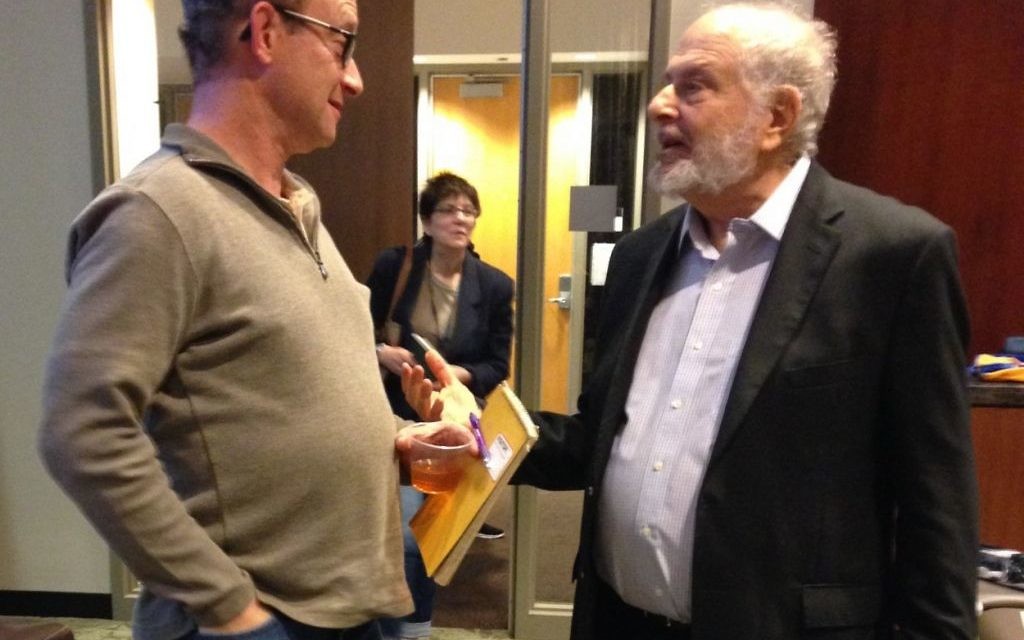Real Life Inspired Uhry’s Midlife Success
On a dark and stormy night, Alfred Uhry, the renowned playwright of “Driving Miss Daisy,” “The Last Night of Ballyhoo” and “Parade,” shed some light on his Atlanta roots, his grandmother and his midcareer writing decisions that made all the difference.
Before approximately 75 students and community members at Emory’s Woodruff Library on Wednesday, Nov. 18, Randy Gue, the curator of modern political and historical collections at the university’s Rose Manuscript, Archives and Rare Book Library, led an informal and informative discussion with the venerable writer.

Alfred Uhry (right) speaks after his Emory talk with AJT contributor Dave Schechter, who had interviewed the playwright over the summer for an article about the centennial of the Leo Frank lynching.
Born in 1936 to Jews of German descent, Uhry grew up on Ponce de Leon Avenue at Clifton Road across from Druid Hills Country Club, “which we could not enter,” he said. He attended Druid Hills High School, where he wrote his first musical, then Brown University, where he wrote two more before graduating in 1958. The first day of theater class at Brown, Uhry met Joanna Kellogg, whom he married at age 22.
Get The AJT Newsletter by email and never miss our top stories Free Sign Up
They moved to New York, and he worked as a lyricist for a couple of years, writing songs for composer Frank Loesser for $50 per week. Uhry’s jobs then ranged from private school English and drama teacher to comedy TV scriptwriter to lyricist rewriting musicals for Goodspeed Opera House to instructor of lyric writing at New York University.
He transitioned from musicals to drama, saying, “I couldn’t do musicals anymore.”
Uhry decided to write about his childhood and what was happening in Atlanta. “It was just there when I needed it. It was just time for me to do that,” he said. “I can’t explain it any other way.”
With little modification from the first draft, he penned “Driving Miss Daisy,” inspired by his grandmother Lena Fox, who lived with his family, and Will Coleman, who drove her from 1948 to 1973 after she had a horrible driving accident.
“So you were an overnight success at 50?” Gue asked, and Uhry agreed.
A veteran actor but hardly a household name in the late 1980s, Morgan Freeman vied for the stage role of Hoke Colburn. Freeman was in “The Electric Company” on television and had recently portrayed what Uhry called a “repulsive crook” in the movie “Street Smart.” But Uhry’s reservations about Freeman were quickly resolved.
After one reading of a scene, Uhry asked Freeman, “How can you do that?” Freeman replied, “I think we knew the same man.”
Uhry felt it only fitting that Freeman played the role of Hoke in the 1989 movie as well. Uhry said Eddie Murphy and Danny Glover had been considered for Hoke, while Elizabeth Taylor had been proposed to play Miss Daisy before Jessica Tandy got the role.
The film received the 1989 Academy Awards for best picture, best adapted screenplay and best actress. Freeman was nominated but didn’t win for best actor.
That writing Oscar joined the 1988 Pulitzer Prize for drama Uhry won for “Driving Miss Daisy.” He also received the 1997 Tony for best play for “The Last Night of Ballyhoo” and the 1999 Drama Desk Award and 1999 Tony for the book of the musical “Parade.”
Gue asked Uhry whether he needed to do research for his subsequent “Atlanta Trilogy” works. Uhry said he was asked to write “Ballyhoo” for the Cultural Olympiad of the 1996 Olympic Games in Atlanta. He thought the last time Atlanta was in the international spotlight was for the world premiere of “Gone With the Wind” in December 1939, so he wanted to tie in that history.
Hitler had just conquered Poland, and Atlanta’s German Jews were celebrating Ballyhoo, a series of dances and activities to help young people meet. There were “Jews that didn’t want to be Jews,” Uhry said. “When I was growing up, they had Christmas trees and Easter egg hunts, and I don’t know exactly why.”
He said “healthy Judaism” was going on in Atlanta, but for the 10 or so Jewish families who had arrived in the 1840s, it was “really sort of messed up” with a great deal of assimilation.
“They wanted to be Southern because they lived here,” Uhry said. “They wanted to be American, and they were Jewish. … It started out that they kept kosher, and they were religious. The ones that started The Temple were fairly religious, I think, but by the time our parents were children, something happened. And that’s how ‘Parade’ got written.”
That musical presents the Leo Frank case from Confederate Memorial Day in 1913 to his lynching in August 1915 and provides an explanation for the scars on subsequent generations of Jews in Georgia.
“I knew something was wrong, and I wrote about it,” Uhry said of the Frank case. It was appropriate that Kennesaw State University’s concert productions of “Parade” this month were performed on Marietta Square, a couple of miles from the 1915 lynching site, and at The Temple, with its history from 1867 through the 1958 bombing, described in “Driving Miss Daisy,” to the modern day.
“Musical theater doesn’t have to be musical comedy,” Uhry said of “Parade,” as well as his next project, a musical about Toulouse Lautrec.





comments